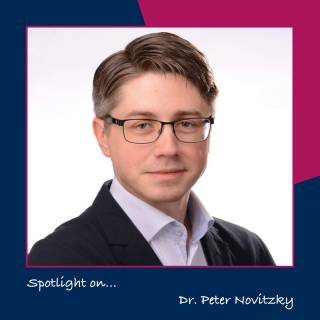Dr Peter Novitzky is a Senior Research Fellow of the PETRAS National Centre of Excellence of IoT Systems and Cybersecurity.
 How long have you been at STEaPP? What does your role involve?
How long have you been at STEaPP? What does your role involve?

I have been with STEaPP for 2.5 years, I started in the middle of the COVID-19 pandemic and met my colleagues in person after a year of working with them virtually. I joined STEaPP as a Senior Research Fellow of the PETRAS National Centre of Excellence of IoT Systems and Cybersecurity. As one of the four Synthesis Fellows—alongside colleagues from Lancaster, Oxford, and UCL—our role is to collaboratively synthesise the diverse elements of the PETRAS research base, construct new understandings, ideas and insights, increase the generality and applicability of these insights, ensuring their relevance and impact in society and the economy. As an applied philosopher focusing on ethical questions around emerging technologies, I conduct research in a wide area of IoT technologies and investigate their impact on (cyber)resilience, safety and security, and overall society. For example, I was involved as a co-investigator in the RED-AID research project with Prof Max Van Kleek (University of Oxford), during which we developed an edge IoT device to address the pressing issue of voice-based fraud and social-engineering attacks.
What drew you to STEaPP and UCL?
In one word: collaboration. I love working together with experts from various fields, throughout my whole career I engage in collaborative science, and STEaPP together with PETRAS as a National Centre of Excellence provides a wide network of collaborative opportunities within UCL as well as across the UK (22 universities). I can only recommend it to anyone.
How does your research feed into your teaching (and vice versa)?
Both, my research and teaching revolve around emerging technologies, so I usually investigate these from the socio-ethical perspective. The results of this research then feed into the teaching curricula, either as concrete examples of the theory or abstract principles I describe during the lectures. In addition, I try to pass over the research methods applied during this work to my students, the results of which feed then into additional research outputs, be these journal articles, reports to the government, conference posters, podcast talks, or public engagement activities.
What inspires you?
Curiosity. Questions. Developing the right research question takes time. Being able to answer them, or at least suggest a potential pathway to understand a particular problem, is extremely exciting and at the same time exhausting. I also enjoy teaching, engagement with students is rewarding in multiple levels: you learn a lot from them; you see their insecurities, which insecurities were yours couple of years ago; you share the partial failures with them as well as great successes.
What achievements are you most proud of?
Most recently I am proud of 5 Master of Public Administration graduates, who I was fortunate to supervise. In terms of teaching I was happy to step-in for the (for me unplanned) course opening lecture for STEaPP’s HtCtW, which would not been possible without the excellent support of our teaching assistant colleagues. It averted major disruptions of the whole course, and together we felt that we were part of something bigger than us. In terms of research, colleagues told me I should be proud of my research article in Science, which apparently led to a change of policy in the European Commission.
Who influenced you?
First and foremost, my parents, both computer scientists. They taught me critical thinking and to remain curious. Furthermore, the whole PETRAS community, which taught me what is a well-functioning and supportive team, both in terms of academic excellence as well as day-to-day operations. Finally, but not least, my mentor Prof Dave De Roure and a colleague Prof Ben Kokkeler, whose humanity and immense support throughout the years made work enjoyable. And, of course, the list is much longer.
If you could give one piece of advice to your teenage self, what would it be?
This is the moment when the ancient Latin proverb comes to application: if I had been silent, I would have remained a philosopher. Jokes aside, maybe, not to be (too) afraid of what the future may bring about? I am really bad with life-advice…
What piece of advice would you like to give to a student?
Another one? Hm… I usually tell my students not to be too preoccupied with the grades. Moments of crises will arise during any work, which is normal, but the most important thing is not to give up, and start again. The lesson of any study is to learn from past mistakes, stand up, and continue the journey.
What three words would you use to describe STEaPP?
Community—support—London
At STEaPP I have found an excellent community of researchers and extremely supportive team, all in the very heart of London, which city is my favourite. What more can one wish for?
 Close
Close

